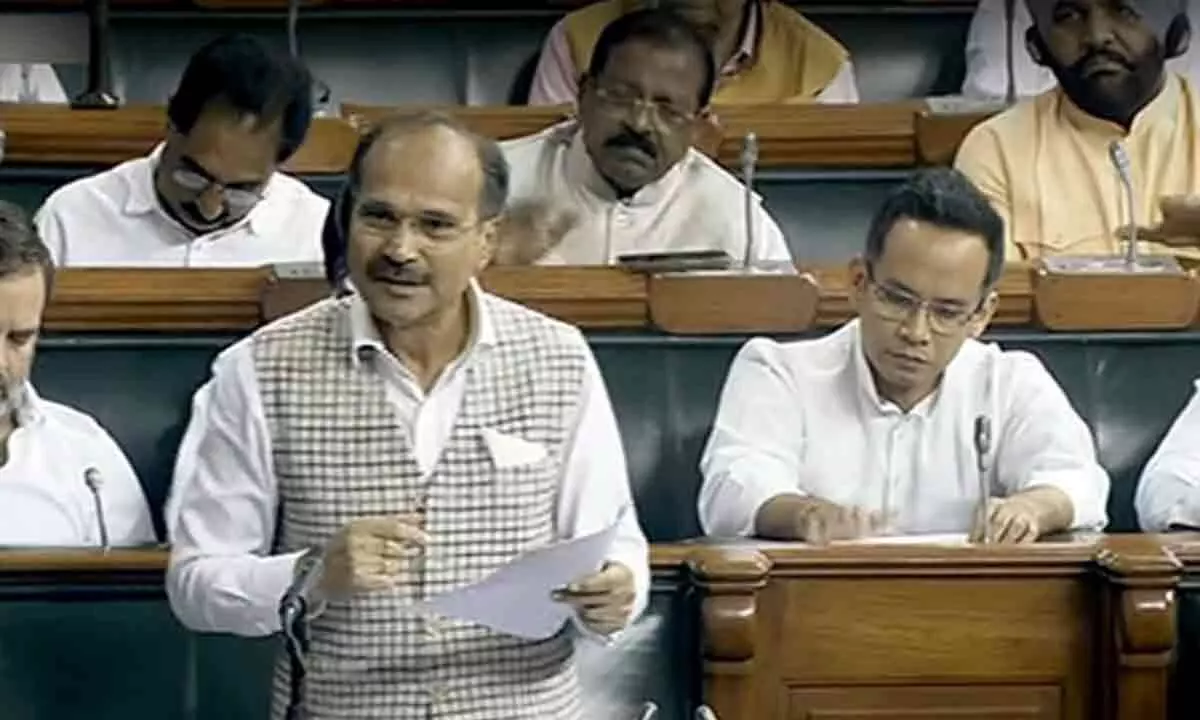Live
- Visakhapatnam: RTO launches special drive
- TGCHE announces key initiatives to strengthen higher education
- Centre considers revival plan for RINL
- Revanth seeks Centre’s green nod for pending State projects
- Optimising space efficiency through ‘compact’ storing
- Four killed after truck collides a bus in Chittoor
- BSNL has highest call drop rate in Hyderabad: TRAI report
- Bihar PSC delegation to study best practices at TGPSC
- FTI-TTP launched at RGIA for faster travel experience
- Minister unveils poster for ‘Skill Sprint’ training prog
Just In
Pandit Jawaharlal Nehru was 'tireless' in listening to voice of opposition, never mocked or deflected says MP Adhir Ranjan Chowdhury

After Prime Minister Narendra Modi on Monday hailed first Prime Minister Pandit Jawaharlal Nehru for his 'stroke of midnight' speech that made India, Congress MP Adhir Ranjan Chowdhury said that he was “tireless” in listening to the voice of the Opposition and “never mocked or deflected” when answering questions.
New Delhi : After Prime Minister Narendra Modi on Monday hailed first Prime Minister Pandit Jawaharlal Nehru for his 'stroke of midnight' speech that made India, Congress MP Adhir Ranjan Chowdhury said that he was “tireless” in listening to the voice of the Opposition and “never mocked or deflected” when answering questions.
Chowdhury also hailed Nehru’s vision saying that in 1946 Atomic Research Committee was formed and from there, "we moved forward and developed ISRO in 1964". Speaking in the Lower House, Chowdhury said, “It is really an emotional moment for all of us to move out from this (old) Parliament building today. We are all present here to bid adieu to our old building.”
Recalling the achievements of India’s first Prime Minister, the Congress MP said, “Pandit Nehru had said that Parliamentary democracy demands many virtues, it demands ability, devotion to work, and self-discipline. Though he (Pandit Nehru) enjoyed a massive majority in the Parliament, he was tireless in listening to the voice of the Opposition and never mocked or deflected when answering questions.”
Chowdhury also said that even the Speaker bell would ring for Nehru when he exceeded his time limit while making speeches in Parliament. “This shows that no one is beyond Parliament's derogation, that was Nehru's contribution to the development of Parliamentary democracy in India,” he said.
He also pointed out Nehru's contribution for India at a time when the country was reeling under the aftereffects of India-Pakistan partition, poverty and other challenges. While commenting on the success of the Chandrayaan-3 mission, Chowdhury said, “There were discussions going on about Chandrayaan, I want to say that in 1946, under the leadership of Jawaharlal Nehru, the Atomic Research Committee was formed. From there, we moved forward and developed ISRO in 1964.”
He further took a swipe at the Centre over the ‘India-Bharat’ row and asked "what would ISRO be called now if the country's name is officially changed to ‘Bharat’." “If not the Indian Space Research Organisation (ISRO) then what? From where has this Bharat, India issue been raised?” he asked.
The remarks from the Leader of Congress came after Prime Minister Modi on Monday talked about the historic moments that defined the old building of Parliament, and recalled how it was here that Jawaharlal Nehru, the first Prime Minister of the country, gave his 'stroke of midnight' speech that made India.
“Nehru's 'Tryst With Destiny' speech made in the old Parliament will continue to inspire us. The echo of Pandit (Jawarhlal) Nehru's 'at the stroke of midnight' in this Parliament will continue to inspire us. And this is that very Parliament where Atal Ji said 'sarkare aayengi, jayengi; partiyan banegi, bigadegi; magar ye desh rahna chahiye'," Modi said in his speech.
In his speech, the Prime Minister said from Pandit Jawaharlal Nehru, Indira Gandhi to Manmohan Singh, this Parliament has given direction to the country. There are many leaders who have strengthened this institution and they all had compassion and commitment for the nation.
“This Parliament will remember Indira Gandhi's decision on Pakistan's partition and formation of Bangladesh," Modi said recalling the contribution of Indira Gandhi in 1971. The Prime Minister said generations of the yesteryears have shown their commitment to making this country and we too need to take the nation forward. "And I am sure, we will work together to make our nation powerful. We have to make sure the faith of the people in this institute is respected and valued," he said.

© 2025 Hyderabad Media House Limited/The Hans India. All rights reserved. Powered by hocalwire.com




